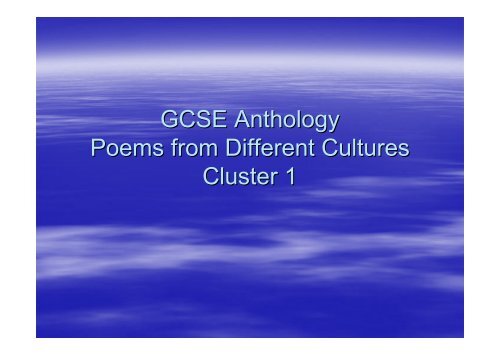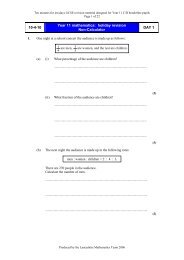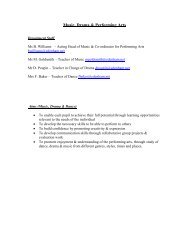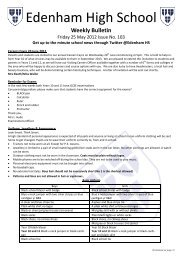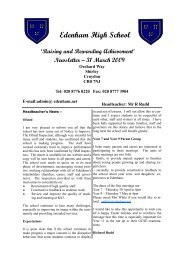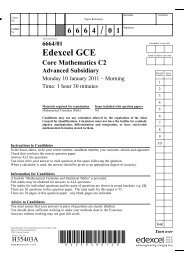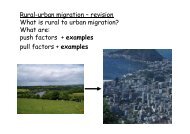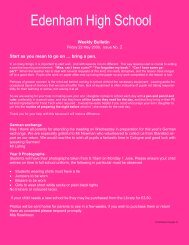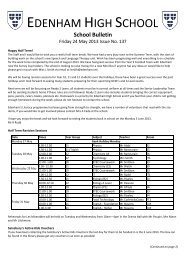GCSE Anthology Poems from Different Cultures Cluster 1
GCSE Anthology Poems from Different Cultures Cluster 1
GCSE Anthology Poems from Different Cultures Cluster 1
Create successful ePaper yourself
Turn your PDF publications into a flip-book with our unique Google optimized e-Paper software.
<strong>GCSE</strong> <strong>Anthology</strong><br />
<strong>Poems</strong> <strong>from</strong> <strong>Different</strong> <strong>Cultures</strong><br />
<strong>Cluster</strong> 1
Limbo<br />
Tells of a journey on a slave ship – <strong>from</strong> Africa to<br />
America.<br />
Written like a song, with a ‘chorus’ in italics. This<br />
gives it a distinct rhythm.<br />
The mood changes through the poem – <strong>from</strong><br />
confusion and fear to hope.<br />
It reminds us of the limbo dance, which is very<br />
difficult as the dancer tries to bend under the limbo<br />
stick, but easier on the way back up. How is this<br />
linked to the ship’s s journey?
Limbo – Themes and links<br />
Main theme seems to be the injustice of<br />
slavery.<br />
Also, the idea of losing your sense of<br />
identity.<br />
Links to ‘Island Man’ – lost identity.<br />
‘Blessing’, ‘Night of Scorpion’ –<br />
retelling an event.<br />
‘What were they like?’ – unusual<br />
layout.
Limbo – Important quotes<br />
“limbo stick is the silence in front of me” (l.1)<br />
This metaphor shows how the narrator is uncertain<br />
of his future.<br />
“long dark deck…”<br />
(l.16)<br />
The alliteration is a harsh ‘d’ sound which could<br />
relate to the harsh conditions on the ship.<br />
“hot slow step…”<br />
(l.48)<br />
These words sound quite painful. This may remind<br />
the reader that the future is bleak for the slaves.
Nothing’s s Changed<br />
Someone walking through ‘District Six’ (an<br />
area of Cape Town, S.Africa), years after<br />
growing up there.<br />
Narrator recalls a time of Apartheid and the<br />
segregation of black and white people.<br />
He is angry that there is a ‘whites only’<br />
restaurant and feels that, after all these<br />
years, nothing has changed - that racism<br />
still exists.
Nothing’s s Changed – Themes and links<br />
Injustice of racism.<br />
Differences between rich and poor.<br />
A political/social divide.<br />
Links to ‘Two Scavengers’ – political<br />
comment, rich and poor.<br />
‘Island Man’, ‘Night of the Scorpion’,<br />
‘What Were They Like?’ – a sense of<br />
place.<br />
‘Vultures’, ‘What Were They Like?’ –<br />
political comment.
Nothing’s s Changed – Important quotes<br />
“but my feet know” (l.11)<br />
This reveals how well narrator knows this area. He<br />
has a really strong bond with District Six.<br />
“whites only inn.” (l.24)<br />
The double meaning refers to the posh restaurant,<br />
but also to the theme of segregation (only white<br />
people allowed in).<br />
“small mean mouth.” (l.44)<br />
This shows the narrator thinking back to when he<br />
was a boy, and shows his feelings of anger.
Island Man<br />
Tells of a man who has moved to London<br />
<strong>from</strong> the Caribbean, but misses home.<br />
First half of poem are his memories/dreams<br />
of home. Then we have the much louder<br />
sounds of London.<br />
The colours mentioned are brighter in the<br />
first half.<br />
In the end, he seems to accept that this is<br />
just the way it is.
Island Man – Themes and links<br />
Losing your identity, moving <strong>from</strong> one<br />
culture to another.<br />
Differences between people and places.<br />
Links to ‘Limbo’ – losing identity, moving to<br />
another place.<br />
‘Nothing’s s Changed’, ‘What Were<br />
They Like?’ – describing a place.<br />
‘Limbo’ – unusual layout.
Island Man – Important quotes<br />
“his small emerald island” (l.10)<br />
This shows how he feels the island is ‘his’,, a<br />
part of him, and emphasises how much he<br />
is missing home. The colour also reminds us<br />
of the contrast with the “grey” of London.<br />
“island man heaves himself” (l.18)<br />
The choice of words here tells us that city life<br />
is a struggle for him, especially when<br />
compared to the Caribbean way of life.
Blessing<br />
Tells of an incident (maybe real) in Bombay, India<br />
– a pipe bursting, which suddenly provides free<br />
water to the people living in poverty around it.<br />
Water, because it means so much (especially if<br />
you consider the heat), is compared to a God and<br />
a precious metal.<br />
The mood is temporarily very happy – everyone<br />
tries to get some of the water.<br />
The ending is more uncertain, or a little bleak, as<br />
we know things will return to ‘normal’ for them.
Blessing – Themes and links<br />
Struggle against poverty.<br />
Idea of religion being important to a culture.<br />
Links to ‘Nothing’s s Changed’, ‘Island Man’ –<br />
describing certain people in a<br />
certain place.<br />
‘Two Scavengers’, ‘Nothing’s<br />
Changed’ – rich and poor.<br />
‘Night of Scorpion’, ‘Two<br />
Scavengers’ – describing an event.
Blessing – Important quotes<br />
“The skin cracks like a pod.” (l.1)<br />
This simple opening, a simile, helps to sum up the living<br />
conditions, emphasising the extreme heat of the sun.<br />
“silver crashes to the ground” (l.9)<br />
This metaphor, comparing the water to silver, tells us the<br />
villagers value water as much as a precious metal.<br />
“frantic hands” (l.17)<br />
The harsh reality of the situation is that people are<br />
desperate to get some water, as they realise that the<br />
pipe will soon be fixed.
Two Scavengers in a Truck…<br />
This describes a specific moment in time, at a red traffic<br />
light at 9am in San Francisco.<br />
The 2 scavengers (bin men) are compared with a rich man<br />
and woman.<br />
The poet uses the idea of the ‘American Dream’ – Is it<br />
real? Is it fair? Are the rich couple any happier than the bin<br />
men?<br />
No punctuation is used, reminding us that all this happens<br />
very quickly.<br />
The poem gets us thinking about social class – Is it right to<br />
class people in this way?
Two Scavengers – Themes and links<br />
The difference between rich and poor.<br />
A political/social divide.<br />
The ‘fairness’ of American society.<br />
Links to ‘Blessing’, ‘Night of Scorpion’ –<br />
describing an event.<br />
‘Nothing’s s Changed’ – political<br />
comment, rich and poor.<br />
‘Vultures’, ‘What were they like?’ –<br />
political comment.
Two Scavengers – Important quotes<br />
“looking down into…”<br />
(l.7)<br />
As they are in their truck, they are higher up than the rich<br />
couple. But they could also look down on them by<br />
thinking they are happier or better than the rich<br />
couple.<br />
“in which everything is always possible” (l.30)<br />
This suggests that TV ads tell us one thing, but we know<br />
that everything isn’t t always possible in real life.<br />
“the high seas of this democracy” (l.36)<br />
This could mean that although part of the ‘American<br />
Dream’, , real democracy is never easy to achieve.
Night of the Scorpion<br />
Told <strong>from</strong> the point of view of a child, describing the night<br />
their mother was stung by a scorpion.<br />
Set in a close-knit village community in poor, rural India.<br />
The scorpion is given a personality – it comes in to<br />
shelter <strong>from</strong> the rain.<br />
The villagers react in very different ways – most of them<br />
panic or say prayers, the father tries various medicines,<br />
and a holy man tries a spell.<br />
In the end, the sting was harmless. The mother is<br />
grateful her children weren’t t stung.<br />
The poem tells us a lot about the culture of these people.
Night of the Scorpion – Themes and links<br />
Idea of religion being important to a culture.<br />
People within same culture having different<br />
beliefs/ideas.<br />
Links to ‘Blessing’ – describing an event,<br />
religious images.<br />
‘Nothing’s s Changed’, ‘Island Man’,<br />
‘Two Scavengers’, ‘What Were They<br />
Like?’ – different cultures/ideas.<br />
‘Island Man’, ‘Nothing’s s Changed’ – a<br />
sense of place.
Night of the Scorpion – Important quotes<br />
“The peasants came like swarms of flies” (l.8)<br />
This simile gives us the impression the villagers<br />
aren’t t really needed or wanted in the hut.<br />
“May the sins of your previous birth…”<br />
(l.19)<br />
This refers to the strong beliefs held in the village,<br />
such as the idea of reincarnation.<br />
“Thank God the scorpion picked on me” (l.47)<br />
The mother is selfless – she is more concerned for<br />
her children, as for them, the sting could have<br />
been deadly.
Vultures<br />
The poet describes two vultures – how they eat<br />
the corpses of other animals, yet also seem to live<br />
together as an affectionate couple.<br />
This situation is compared to that of a Nazi<br />
commander – murdering people in a concentration<br />
camp during the day, yet becoming a loving father<br />
in the evening.<br />
The poem asks us to consider whether evil exists<br />
in all of us, or if even the most evil beings are<br />
capable of love.
Vultures – Themes and links<br />
Human attitudes – how we treat each other.<br />
The fairness of society.<br />
How the nature reflects the human race.<br />
Links to ‘What were they like?’, ‘Nothing’s<br />
Changed’, ‘Two Scavengers’ –<br />
political/social comment, how<br />
humans treat each other.<br />
‘Night of the Scorpion’, ‘What were<br />
they like?’ – human attitudes.
Vultures – Important quotes<br />
“In the greyness and drizzle” (l.1)<br />
This sets the mood of the poem, creating a very<br />
bleak atmosphere.<br />
“with fumes of human roast…”<br />
(l.32)<br />
The disgusting image of burning human bodies<br />
really emphasises the idea of the commander<br />
being evil. But it also makes the image of him as a<br />
loving father even more unbelievable.<br />
“grants even an ogre…”<br />
(l.43)<br />
The poet seems relieved that even an evil man is<br />
capable of showing some tenderness.
What Were They Like?<br />
Written in the style of an interview, with six<br />
questions being asked about the people of<br />
Vietnam and how they used to live.<br />
All of the questions are asked before the answers<br />
are given, perhaps by a member of the army (use<br />
of the word ‘Sir’).<br />
The answers contain more detail and seem to<br />
focus on human suffering.<br />
The poem aims to teach us how the culture of<br />
Vietnam was severely affected by the war.
What were they like? – Themes and links<br />
Human attitudes.<br />
The injustice of war.<br />
The idea of people losing their culture.<br />
Links to ‘Vultures’, ‘Nothing’s s Changed’,<br />
‘Two Scavengers’ – political<br />
comment.<br />
‘Island Man’, ‘Nothing’s s Changed’,<br />
‘Night of the Scorpion’ – a sense of<br />
place.
What were they like? – Important quotes<br />
“Sir, their light hearts turned to stone.”<br />
The contrast of light and heavy helps us to understand<br />
how much the people of Vietnam have changed.<br />
“laughter is bitter to the burned mouth.”<br />
The ‘b’ sounds are quite harsh here. This alliteration<br />
emphasises the hurt and pain the people must have<br />
been through.<br />
“All the bones were charred.”<br />
This refers back to the question about ornaments, but it<br />
also gives us a terrible image of a village being<br />
bombed and bodies on fire.


